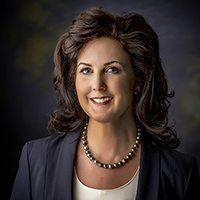In This Section

Stacy Hopkins
Of Counsel, Paul Hastings LLP
Stacy Hopkins began her career in commercial finance as a law clerk to a United States Bankruptcy Judge. Following her clerkship, she joined Paul Hastings LLP as member of the Finance & Restructuring practice and became a partner advising commercial finance companies, hedge funds, and banks on leveraged loans, asset-based financings, debtor-in-possession financings, syndications, and leasing transactions in a variety of sectors. Stacy then joined Wells Fargo and served as senior vice president in the Healthcare Finance group at Wells Fargo Commercial Capital. In this role, she led the negotiation, documentation, and execution of all transactions (asset-based, cash flow, and real estate) in a business capacity for the group across a variety of healthcare sectors.
Stacy has re-joined Paul Hastings LLP and is leveraging her business insights to advise clients on structuring, negotiating, and documenting cash flow and asset-based transactions across all lifecycles of a loan. While she has extensive knowledge of healthcare finance, Stacy is also experienced in other sectors, such as casinos, restaurants, media, manufacturing, and entertainment along with structuring and documenting unitranche and split collateral deals.
What do you know now that you wish you knew in the beginning of your career?
Being flexible and understanding that thorny situations are for the most part temporary.
What role has mentoring played in your career?
Mentoring has played an enormous role in my career. By mentoring, I mean not just mentors for me, but also the mentoring of others. I’ve gained a lot of insight and learned a lot from those I’ve mentored. I sought out mentors while I was in law school and much of the advice they gave me holds true. I would encourage others to seek out mentors not just in their particular industry, but also outside their industry. Fresh perspectives are priceless. Plus, you may want to pivot your career at some point.
What do you enjoy most about your role? Least?
Making a deal work! It’s incredibly satisfying to find workarounds to challenges on a deal. Especially when working a deal to finance a healthcare-related company as it is particularly rewarding to facilitate those companies that are providing necessary healthcare or improving how healthcare is provided. However, there’s a collective expectation that a response must be instantaneous. We live in an instantaneous world. We are all moving at incredible speeds with technology, and that’s fantastic. However, some situations require thought and analysis before responding. Setting expectations is always a challenge.
How do you balance work/personal time?
Let’s be real – balance is a misnomer. Not even a balance is always in balance. It’s more of a juggle. I prefer to approach it from a “role” perspective and be present in whatever role I’m in at the time, understanding that those roles may vary from day-to-day and minute-to-minute. I am not saying it’s easy, but thinking about work and personal time in this manner helps me focus my attention to where it needs to be at that time, whether it is work, family or friends, and without worrying about whether I’m achieving balance.
What effect, if any, has working remotely had on your career and/or your industry? What have been the challenges and how have you worked to overcome them?
I pivoted my career during the pandemic and recently rejoined Paul Hastings. Yet I am still working in the same place in my home since last year. It’s a bit surreal. Given that everyone else is working remotely, I find it’s easier to connect and network with others, even if it’s for the first time. I’m sure others, like me, are eager to talk to someone other than whom they share living quarters with! The challenges include that my new “co-workers” (a/k/a my family) in the “home headquarters office” are loud on their calls and aren’t doing their share of cleaning up the “break room” downstairs!
What do you think work will look like in the post-pandemic world?
Working remotely definitely has its pros and cons. It has been a great equalizer for networking because everyone is in the same boat and willing to have conversations whether on Zoom, Facetime, or just by phone. The in-person connection is somewhat lacking, but there are positives. The pandemic has proven that working from home can be successful and, with many companies looking to curb expenses even pre-pandemic, I believe there will be more flexibility in work styles, whether it be hybrid workweeks or office hubs. Plus, doing away with a traffic-laden commute is always a positive.
Professional Development Courses
- Live online classes for ABL and Factoring professionals
- On Demand classes in Appraisals, Factoring, Legal, Workout & Bankruptcy
